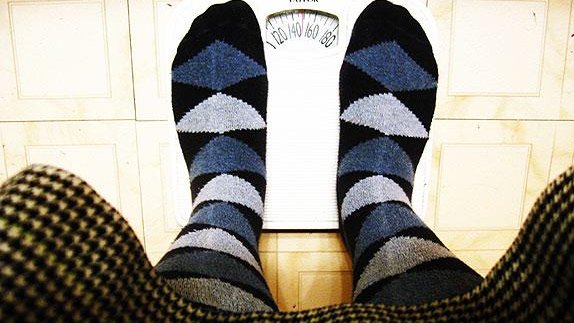Standing on a diet scale. (Jodi Green on Flockr)
{WOMENSENEWS}-- As a young feminist growing up I dressed to please myself, thought that others should value me for my insides, not how I looked from the outside.
But after my second child was born, I struggled to lose weight. When I reached my 40s I found myself Googling "Is It Feminist to Diet?"
At the gym I came across a wide range of body types. But the ones I saw over and over in the fitness magazines--demonstrating how to do exercises--were predictably stick-thin women with no cellulite. Diet articles ran under headlines such as "Lose 8 Pounds in 8 Weeks."
I had entered the domain of dominant culture, where women compared themselves to supermodels or to fitness expert Jillian Michaels and weight loss tips included chewing gum when you are hungry.
The hugely popular TV program "The Biggest Loser" tortures contestants with humiliating displays of their fat bellies, puts them through grueling workouts and tests of willpower where they are locked in a darkened room with pastries.
As I began to lose weight I faced the question of how much weight loss was enough?
If you ask a fashion magazine, then the answer is "never enough."
If you ask the Internet, you'll be led to the BMI, or body mass index, model, which looks at body shape based on a person's height and weight.
The fashion-fixated frame of mind can take you down a path that leads to obsessively counting calories, secretly starving yourself, anorexia, bulimia. It's happened to the best of us, really, even feminists.
Confronting Self-Image
And so a feminist on a diet confronts her self-image.
Am I bad because I'm overweight, because I couldn't stick to my diet? Am I doing this for me or to be attractive to men?
Feminists have traditionally shied away from the health-improving and empowering aspects of fitness and weight loss because the looking-good-for-men aspect is so over-emphasized.
The truth is, a lot of us are set up to fail with diets and fitness goals that are unrealistic. In fact, no matter how hard we workout, it won't turn our hair blond or make our stretch marks disappear.
I, for one, could have used some feminist-centered guidance on eating right to take care of yourself and to nourish your body. I wish I'd found more articles from cardiologists about the heart-healthy benefits to losing the "spare tire." I wish I'd seen more average bodies in fitness magazine demoing exercise moves while along my own fitness journey.
What did help? After all, I did eventually lose 25 pounds over three years.
It was an evolution, not an event. I started with Body for Life, a weight loss and exercise program, which inspired me in the first place and taught me to exercise "no matter what."
I periodically tracked my workouts and counted calories.
I credit Self magazine's superfood diets, such as the Jump Start Diet, which weaned me off highly-processed shakes and bars and turned me onto real food.
Geneen Roth's "Feeding the Hungry Heart: The Experience of Compulsive Eating" taught me to eat mindfully and be kind to myself. And Joe Cross' film, "Fat Sick and Nearly Dead," inspired me by seeing the power of juicing vegetables.
A Unique Journey
Mostly though, what I discovered was that this was my own journey. And that following someone else's diet was following their rules. Finally, I realized, I could go at my own pace, fall back and recover. And it had to be for me, ultimately, and I had to accept myself. I did eventually get there.
Now, I juice regularly, exercise daily, focus on eating whole foods and eating the rainbow of colored vegetables. I don't deny myself anything I really want. That means I've figured out that three ounces of vodka tastes great in apple-carrot juice.
My journey began during a time in my life when two close family members were critically ill. One died and the other survived. Going to the gym gave me a reprieve from the stress and dieting gave me some semblance of control. Being healthy and strong reassured my children.
Sure, we might be at risk of "waking up in the morning and recalling every single thing I ate the day before, counting every calorie I consumed so I know just how much self-loathing to take into the shower," as Julia Roberts proclaims in the movie version of "Eat, Pray, Love." But I think, if we're doing it well, we're taking care of ourselves, and that is never a waste of time.
And seeing every version of yourself along the way as wonderful is a powerful truly feminist exercise. It's good to be healthier and feel better; and to look good and like looking good.















